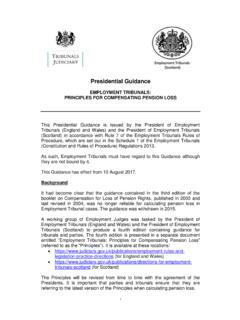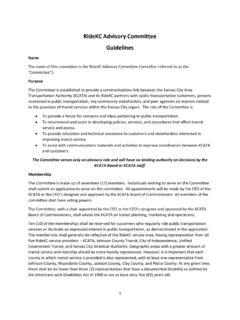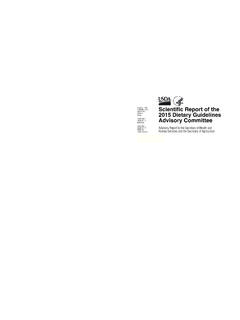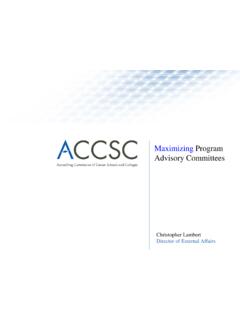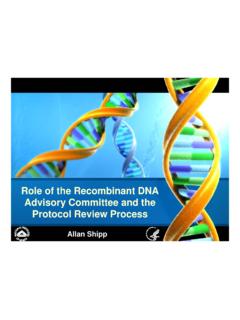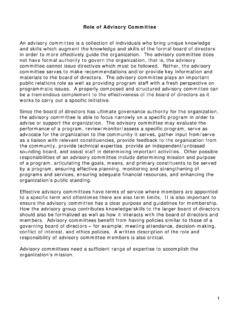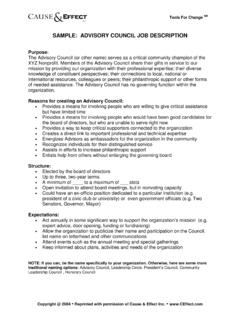Transcription of Lord Chancellor and Secretary of State’s Directions for ...
1 Lord Chancellor and Secretary of State s Directions for advisory committees on Justices of the Peace July 2013 (As amended in January 2015) Crown copyright Produced by Ministry of Justice Alternative format versions of this report are available on request from David Hall, telephone: 020 7073 4791 Lord Chancellor and Secretary of State s Directions for advisory committees on Justices of the Peace This information is also available on: Contents 1 Contents Introduction 3 Part 1 advisory committees 4 Status 4 Functions 4 advisory sub- committees 4 advisory committee and sub-committee secretaries 5 advisory committee and sub-committee chairmen 6 advisory committee members 8 Exclusions from membership 8 Terms of office 17 Training 18 Conduct
2 19 Matters to bring to the attention of the Secretary 19 Register of interests 20 Complaints 20 Legal proceedings 20 Disclosure of membership 20 Expenses 21 advisory committee relationships with HMCTS and bench chairmen 21 Part 2 Eligibility for the magistracy 22 Factors affecting eligibility 22 Minimum length of service expectation 23 Occupations, voluntary work and political activity 23 Convictions, orders and other legal proceedings 24 Motoring offences 24 Family or close friends 25 Bankruptcy and liquidation 25 Divorce proceedings 25 Maintenance or child support orders 26 Relationships to other serving magistrates 26 Crime and Disorder Act 1998 26 Rehabilitation courses 26 Government steering groups 26 Part 3 The magistrates selection process 27 Guiding principles 27 Contents 2 The Key Qualities 27 Welsh language-essential posts 28 The application to become a magistrate 29 Visits to a magistrates court 29 Receiving and dealing with applications 29 Managing the number of applicants to be interviewed 32 Practical arrangements for interviews 33 Interview panels 35 Treatment of
3 Candidates at interview 35 Candidates who have a disability 36 The first stage interview 36 The second stage interview 38 Post assessment procedures 41 Review of a panel s or committee s decision 43 Part 4 Submitting recommendations for appointment 45 Timing 45 Composition of the submission 45 Issues which may require clarification 46 Disclosure & Barring Service (DBS - formerly the Criminal Records Bureau) 47 Magistrates HR Team procedures 49 Swearing-in of newly appointed magistrates 50 Part 5 Matters arising after appointment 51 Guiding principle 51 Attendance 51 Leave of absence 55 Reassignments (transfers)
4 To other local justice areas 59 The Supplemental List 62 Complaints about Supplemental List magistrates 65 Resignation, retirement and death 65 Re-appointments 66 Change of name, address, etc 68 Appendices 69 Introduction 3 Introduction This edition of the Lord Chancellor and Secretary of State s Directions for advisory committees on Justices of the Peace replaces the edition issued in August 2011 (and refreshed in November 2012). The document is laid out in five parts: Part 1 advisory committees Part 2 Eligibility for the magistracy Part 3 The magistrates selection process Part 4 Submitting recommendations for appointment Part 5 Matters arising after appointment advisory committees must adhere to these Directions .
5 However, it is recognised that the Directions cannot cater for every circumstance that will arise in the course of a committee s work. committees should use sensible discretion in dealing with such issues, ensuring that they do not deviate from the spirit of the Directions . They should always seek guidance from their named contacts on the Magistrates HR Team at the Judicial Office (details of whom are circulated regularly) about any queries regarding the application of these Directions to a particular issue. The Lord Chancellor acts in consultation with the Lord Chief Justice as Head of the Judiciary in matters concerning the appointment of magistrates. Both place considerable confidence in advisory committees and will generally act on their recommendations and support their decisions.
6 However, there may be occasions when the Lord Chancellor or the Lord Chief Justice disagree with a committee s decision and overrule it. In doing so, they will provide the committee with their reasons. advisory committees role in disciplinary proceedings is given by the Complaints (Magistrates) These rules are part of a system in which statutory responsibility for judicial disciplinary issues is ultimately shared by the Lord Chancellor and the Lord Chief Justice. This document can be accessed online via the Judicial Office website Email copies in Word or PDF format are available on request from the Magistrates HR Team. Hard-copies will only be made available in exceptional circumstances.
7 Any requests for hard-copies, or for copies in alternative formats such as Braille, should be made to the Magistrates HR Team. 1 Part 1 advisory committees 4 Part 1 advisory committees Status The Lord Chancellor s advisory committees on justices of the peace are advisory non-departmental public bodies which carry out functions on behalf of the Lord Chancellor . The Lord Chancellor determines the number of advisory committees , their organisation, structure, membership and operating practices. Functions The functions of advisory committees are to: recruit and recommend to the Lord Chancellor and Lord Chief Justice candidates for the magistracy (within parameters set by Her Majesty s Courts and Tribunals Service (HMCTS) (Appendix 1A), and candidates for membership of the advisory committee (and any sub- committees ); to consider the data gathered by the Secretary /justices' clerk as part of the annual judicial resource exercise and provide observations on the factual data, at the same time as the relevant bench chairmen and a representative of the Magistrates' Association; establish (if needed), and oversee the work of, sub- committees .)
8 Ensure that magistrates fulfil their undertaking to sit and complete any required training; draw the attention of bench chairmen and justices clerks to magistrates sitting too little or too often, and take action accordingly; investigate allegations of misconduct by magistrates and make recommendations to the Lord Chief Justice and the Lord Chancellor in accordance with the Complaints (Magistrates) Rules; and review decisions by the Bench Training and Development Committee (BTDC) that a magistrate has failed to reach the required standard and to make any formal recommendation for removal to the Lord Chief Justice and the Lord Chancellor in accordance with the Complaints (Magistrates) Rules.
9 advisory sub- committees advisory committees will decide, following discussion with HMCTS, how many, if any, sub- committees are required in their respective areas. The functions of sub- committees are to: Part 1 advisory committees 5 recruit and interview candidates for the magistracy, as required by the advisory committee; contribute to the development of recruitment strategies; and monitor the sittings of individual magistrates on their benches. Sub- committees exercise their functions on behalf of the parent advisory committee. They must not deviate from any guidance or instruction given to them by the advisory committee. The Secretary of the advisory committee should keep the need for sub- committees under review and, if appropriate, revise the structure in order to make best use of their and HMCTS resources.
10 The decision to establish or dissolve sub- committees should be based solely on the need to conduct the functions of the parent advisory committee as efficiently as possible. Before varying the existing structure, the Secretary should consult the chairman of the parent advisory committee, the chairmen of any existing sub- committees , and the appropriate senior official in HMCTS. advisory committee and sub-committee secretaries Appointment Each advisory committee will have a Secretary who will be appointed to the role by virtue of being the justices clerk for the area. The Magistrates HR Team should be notified of any impending change to the role of Secretary resulting from a change of justices clerk.


